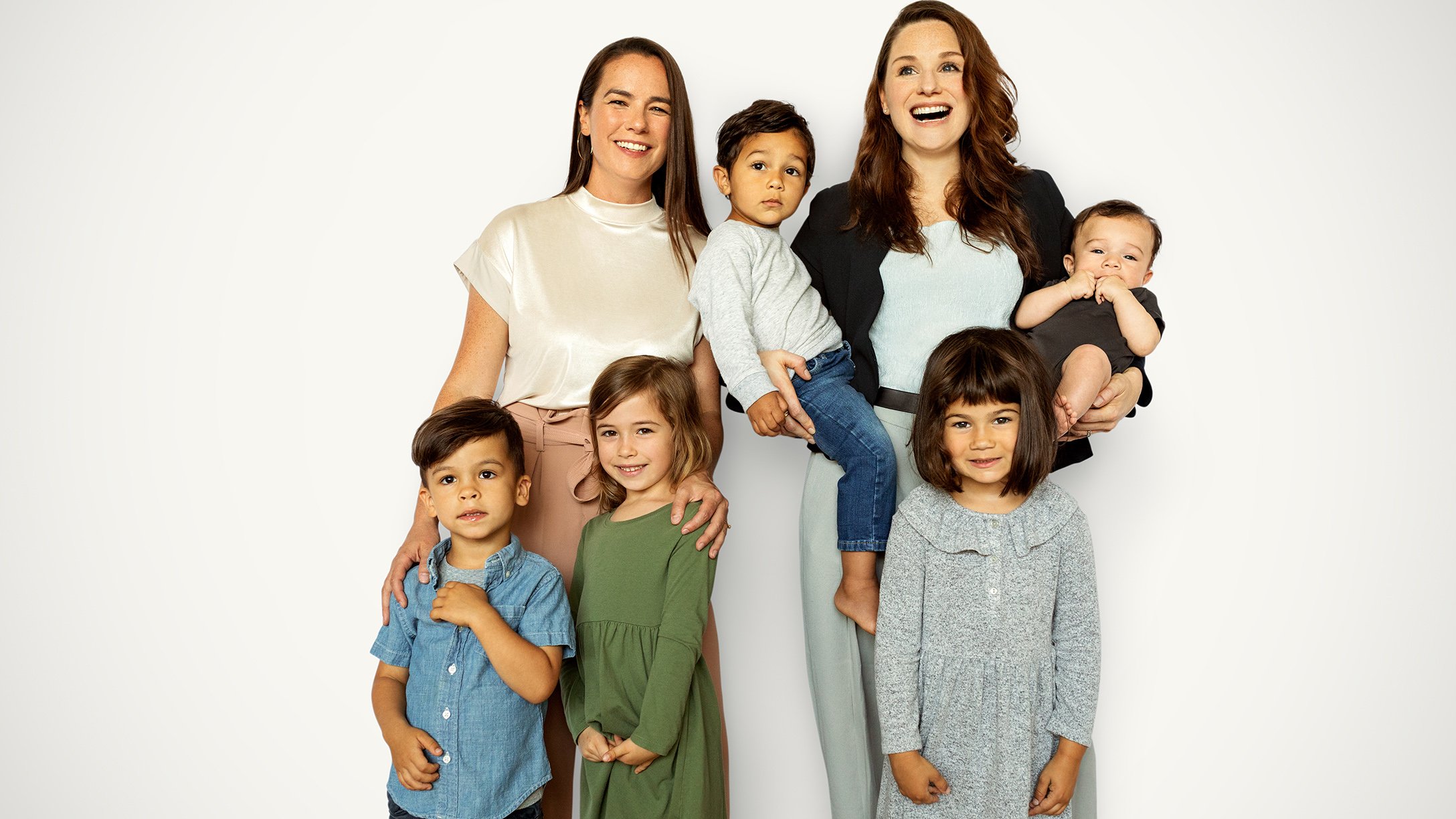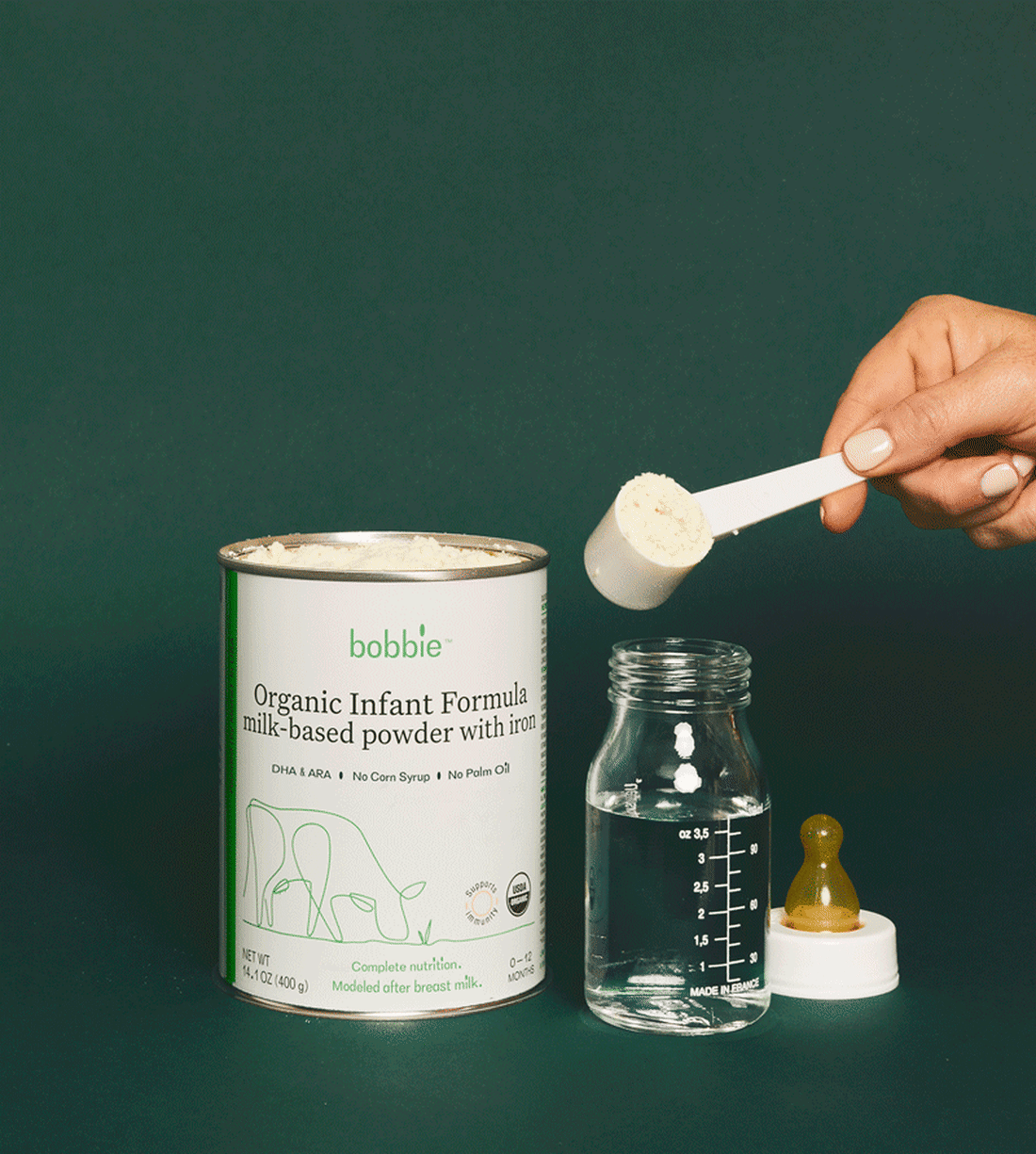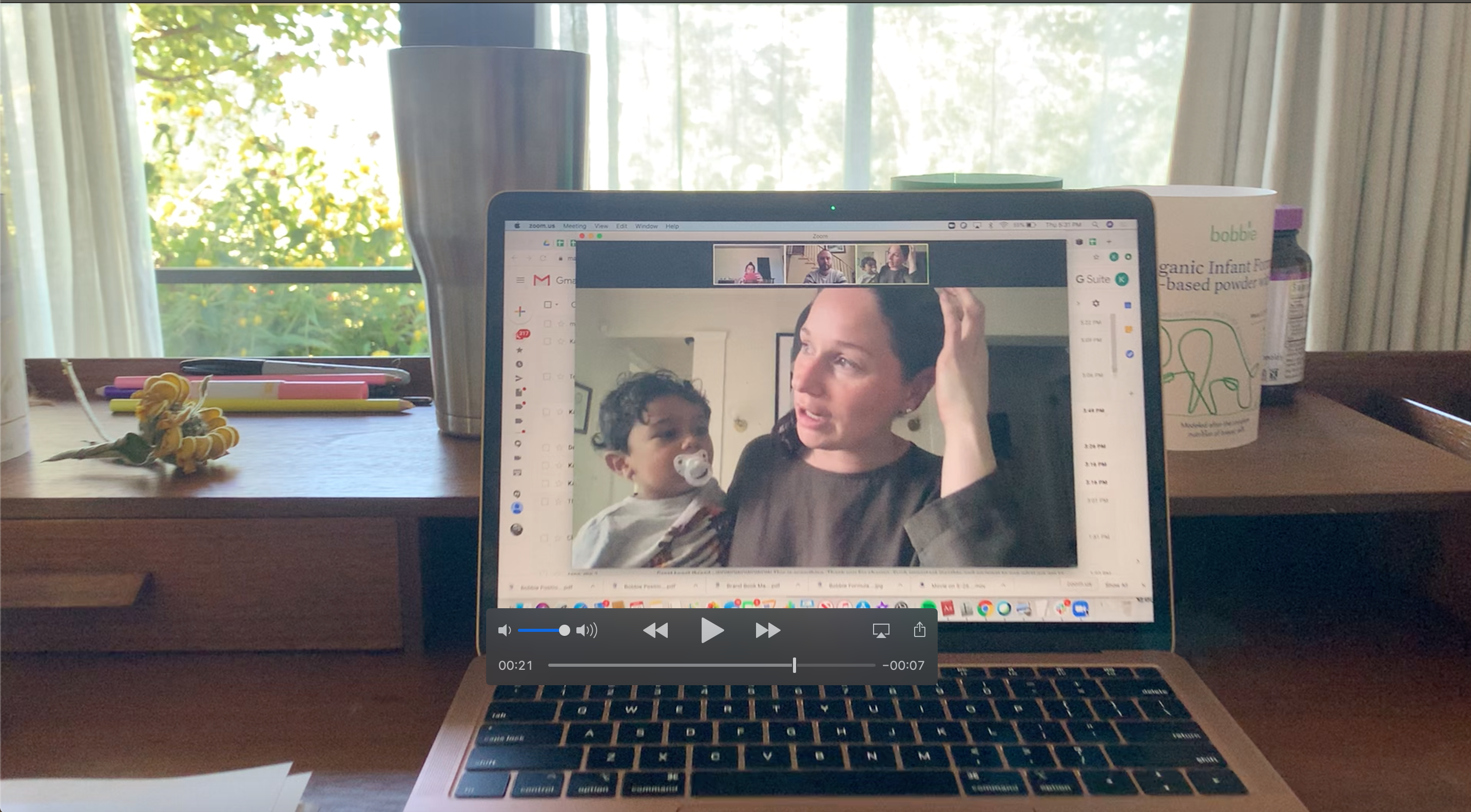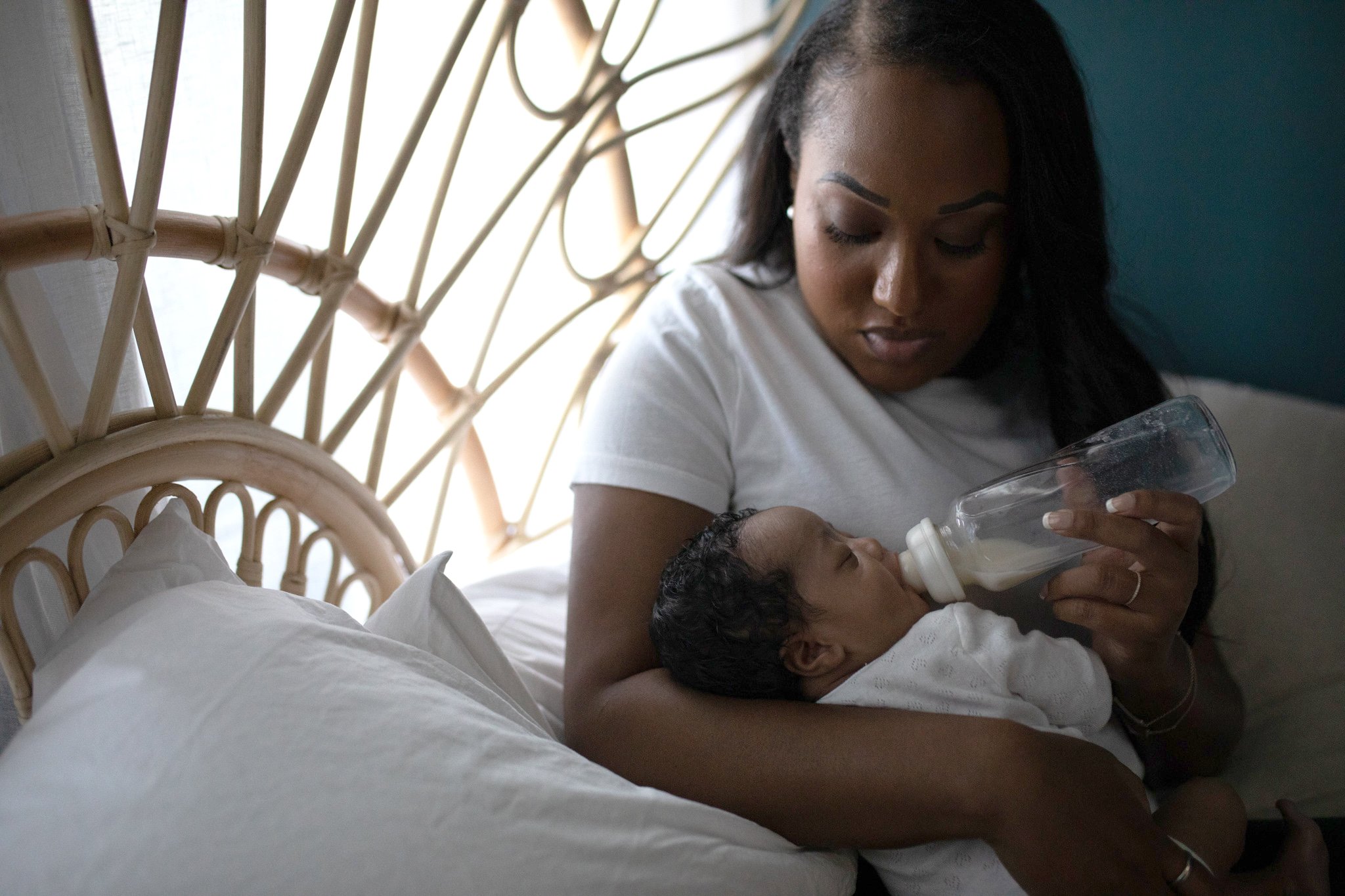
When Laura Modi found herself searching for baby formula in a San Francisco pharmacy at 2 in the morning, her painful mastitis infection wasn’t her biggest parenting challenge — feeding her 1-week-old daughter was.
The infection, the mom of three recalls, brought her breastfeeding journey “to an abrupt and heartbreaking end,” and she suddenly found herself “looking for a product to feed my baby in a locked plastic case between cat food and diapers.”
Not only that, but Modi was completely unimpressed by what she saw on the ingredient list of the formulas in that pharmacy — things like corn syrup, palm oil, maltodextrin, and glucose.
“I was so careful for nine months about what I put in my own body, what I ate, the prenatals I took, avoiding sushi, deli meat, and, of course, even cheeky sips of wine,” Modi tells Mom.com via email. “Then to find myself reading ingredients on formula that I would hardly consume myself was startling.”
That’s when the Ireland-born mom (pictured above right) knew that she wanted to make a change.
“When I realized that the alternative for many U.S. parents was importing expensive organic formula from Europe, I said to myself, there has to be more optionality for parents here who are clearly looking for something beyond what is available on U.S. shelves,” Modi says.
Three years later, Modi and co-founder/COO Sarah Hardy (pictured above left) have launched Bobbie, an organic, European-style infant formula that meets U.S. Food and Drug Administration (FDA) standards and is available to parents who have chosen to formula-feed — judgment not included. Because, honestly, who needs that?
After all, every mother’s feeding journey is different, and many find themselves having to make detours when carefully considered plans suddenly present more pitfalls than possibilities.
Modi, who is Bobbie’s co-founder and CEO, answered more of our questions about mom guilt, how Bobbie is different from other formulas, and how exactly they came up with the name.
Why do you think moms feel guilty about giving their kids formula?

Our generation of moms has been drilled with the “Breast is Best” mantra as the first — and only — way we should approach feeding our baby. It starts even when you are pregnant, when you sign up for a breastfeeding class and are taught to hold a baby doll to your boob, yet no one tells you how to make a bottle (which is actually quite intimidating the first time you do it).
Layer on top of that, what I refer to as “subconscious judgment” from friends, family, pediatricians, where they ask, “How is breastfeeding going?” vs. “How is feeding going?” We are conditioned to always put breastfeeding first, so by process of elimination, anything after that is considered “worse” than best! It’s overwhelming.
When we commissioned research about the stigma on infant formula, we were shocked to learn that two out of three moms in the U.S. felt judged by someone in their life for turning to formula. No one should ever feel shame, judgment, or stigma for how they choose to feed their baby. Period.
A loved, milk-drunk, growing baby is all that matters, whether it’s breastmilk, storebrand formula, European formula, or Bobbie. Let’s just support parents in whatever twists and turns their feeding journey takes.
Let’s just support parents in whatever twists and turns their feeding journey takes.
What inspired the name Bobbie?
My daughter, Mary, first started to babble and could not pronounce the word “bottle,” and she ended up calling it a “bobbie” in her little baby words. So when we had to think of a word that encompasses what a baby would want, we decided to make it as simple as Bobbie. Plus, I personally love that when you squint, it kind of looks like “boobie.”
What makes Bobbie different from other formulas?

Bobbie is the first organic, European-style recipe that meets all FDA requirements for infant formula. We are providing a safe, organic, purposefully sourced, U.S.-regulated formula alternative to parents going to the black market of European formula.
“European-style” means that we are striving to meet the nutritional standards for EU formula while also meeting all FDA requirements. This is critical for nutrients like DHA, where we will meet the EU standard of 20 mg. — but in the U.S., there is no set standard for DHA at all. We’ve also chosen to leave out ingredients like corn syrup, maltodextrin, and palm oil and focus on choosing the very best ingredients that strive for gentle digestion.
Our milk is supplied by Organic Valley pasture-raised cows, we chose a 60:40 whey-to-casein ratio, which mimics that of breastmilk, and we left the palm oil out to ease digestion on tiny tummies.
As moms and the co-founders of a start-up company, how do you make it all work?

I’m not going to sit here and tell you that I have achieved some sort of blissful work-life balance. Especially in this s— year that has been 2020. It’s been hard, especially in a fast-paced start-up, during a pandemic, and with a newborn and two toddlers. There are days when I feel like an absolutely terrible mom and days when I am able to fully put work aside and be present with my kids. I have had to sacrifice a lot of bath times, weekend excursions, and I ultimately had to stop breastfeeding after about four months because it was just too overwhelming and stressful to try and find uninterrupted time while trying to also look after my 4-year-old and a 2-year-old.
I think we are all just doing the best we can to juggle what is on our plate, and I have no problem asking for help when I need help, whether that’s my spouse, my parents, a nanny, or a quick babysitter. We absolutely have to stop pretending we can (and should) do it all.
What do you want moms who've been 'mom-shamed' about giving their kids formula to know?

To the moms who are pumping themselves dry, or questioning if their baby has a hungry cry, or counting every ounce at the expense of their mental health, I would say, first and foremost, I empathize with your journey because I was also there, too.
In hindsight of having three kids, I can now confidently say from my own personal experience that there is no “best” way to feed a baby. It is whatever works best for YOU and your entire situation. This is not up for someone else’s judgment. No one knows what else you have going on in your home, your life, your job, your marriage, your head. Be confident in your decision that you know is best for you and your family.
(Editor’s Note: Modi’s answers have been edited for length and clarity.)
